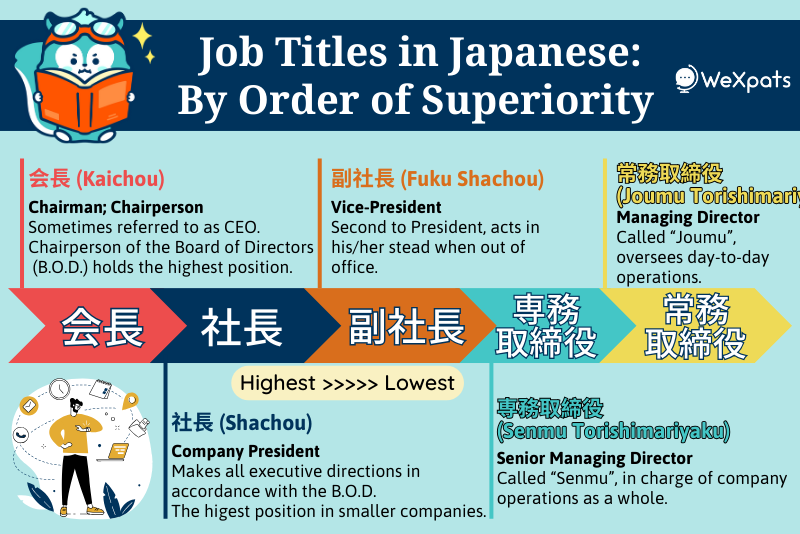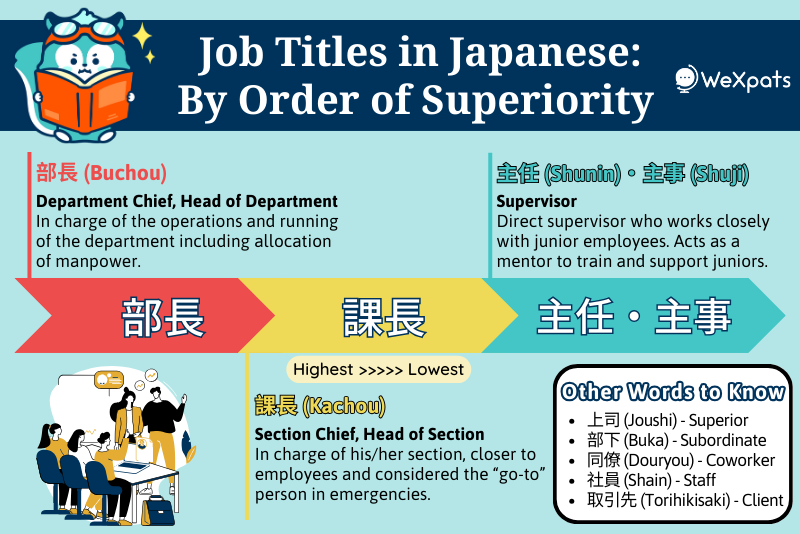Part of Japanese business etiquette is addressing superiors by their company positions and job titles in Japanese. It is also important to understand the Japanese company hierarchy system.
First Pubished: 2020-10-26
Updated: 2024-05-17
Table of Contents
- Importance of Job Titles in Japanese Work Culture
- Job Titles in Japanese
- Things to Remember About Honorific Japanese Suffixes
- Find a Job in Japan with WeXpats
 Are you having any issues with job-hunting in Japan?
Are you having any issues with job-hunting in Japan?
Importance of Job Titles in Japanese Work Culture

Two things come to mind when referring to "job titles", one is your occupation, and the other is your position in the company. In Japan, most of the time, the higher your company position, the longer it indicates your years worked in that company. Thus, company loyalty and work experience are often tied directly to your company position, and therefore, job title. This is why job titles in Japan are so significant, as they reflect all your hard work in terms of your career growth and development.
Another important point of communication in Japan is knowing how to address each other according to your standing versus the other person’s standing. It is even important outside of a workplace or business context - there is a lot of posturing in trying to figure out if the person you just met is older or younger in order to know how to address them going forward. And at work, if you know that someone has been in the office longer than you, you have to address them formally as your senpai, aka senior, and even more so if they have a formal higher title. It is one of the first things people look at during a business card exchange.
In this article, we will focus more on the “position in the company” definition of job title.
Writer's Pick
Job Titles in Japanese
For corporate organizations in particular, it is a sign of respect to address your superiors by their respective company ranks. Let’s take a look at the most commonly used company positions and job titles in Japan.
Note that job titles may vary between companies. Some job titles are interchangeable, or certain companies may not have certain positions, or choose not to use them.

会長 (Kaichou) - Chairperson
会長 (Kaichou) is the Chairperson, and can sometimes be referred to as the CEO, aka 代表取締役 (Daihyou Torishimariyaku), which directly translates to “representative director” in English. The position of Chairperson of the Board of Directors holds the highest power in the company. In smaller companies, an individual can be the president (社長 Shachou) and chairperson at the same time.
社長 (Shachou) - President
社長 (Shachou) is the Company President, the most senior person in the company who makes all executive decisions in accordance with the Board of Directors (headed by the Chairperson). The Shachou is usually chosen by vote among the Board of Directors. This is a non-legal title.
副社長 (Fuku Shachou) - Vice-President
The Vice-President is second to the President, and acts in the President’s stead when he/she is out of office. Also a non-legal title.
専務取締役 (Senmu Torishimariyaku) - Senior Managing Director
Referred to as 専務 (Senmu), the Senior Managing Director has lesser corporate powers compares to the president and vice-president but has significantly more corporate powers compared to the managing director. He/She takes a high-level perspective look at the entirety of the company’s operations as a whole.
常務取締役 (Joumu Torishimariyaku) - Managing Director
Referred to as 常務 (Joumu), the Managing Director is considered as an advisory position to higher positions such as the president and vice-president. The primary responsibility of the Managing Director is to oversee the day-to-day operational performance of the company.

部長 (Buchou) - Department Chief
部長 (Buchou) is considered the “middleman” in the corporation management ladder as he/she has a glimpse of the ongoings at the higher-ranked levels, and at the same time also leads his/her own department. The Department Chief also has the responsibility to properly allocate manpower resources for the smooth functioning of the department he/she is in charge of.
課長 (Kachou) - Section Chief
Dubbed as the “control tower” of the organization, the Section Chief is close to the rank-and-file employees as they oversee the work of employees under them, and are considered as the “go-to” person in emergency situations.
係長 (Kakarichou) - Subsection Chief
A similar position to Kachou, but is assigned to overlook a specific team instead of the whole section.
主任 (Shunin) or 主事 (Shuji) - Supervisor
The Supervisor is closest to the employees and directly overlooks their work progress. He/She has work expertise, and also carries the position of a mentor to help train and support employees.
Keep in mind that whether these job titles are used depends on your company’s work culture. There are some Japanese companies who avoid stuffy job titles and just add -san suffix to the back of the name. More on suffixes below.
The above are some of the business, corporate, or job titles used in Japan. Other positions are as follows, but these are not used when addressing the person:
- 上司 (Joushi) - Direct Superior
- 部下 (Buka) - Subordinate
- 同僚 (Douryou) - Coworker; Colleague
- 同期 (Douki) - Coworker/Colleague who entered the company at the same time as you
- 社員 (Shain) - Staff
- 取引先 (Torihikisaki) - Client
Things to Remember About Honorific Japanese Suffixes

Japanese honorific titles are basic Japanese manners. It is a sign of courtesy and respect, especially to elders. How do you use Japanese honorific titles? There are both formal and informal Japanese suffixes so it is important to know which to use.
Formal Japanese Honorific Titles
様 (-sama) and さん (-san) are formal and polite Japanese suffixes.
-
様 (-sama) is used to denote gods, royalty, clients, and customers.
Example: 神様 (Kami-sama) for God, お姫様 (O-hime-sama) for Princess, お客様 (O-kyaku-sama) for Customers, 鈴木様 (Suzuki-sama) for a specific Customer. -
さん (-san) is the most commonly used honorific title used to refer to a person. It roughly translates to Ms., Mrs. or Mr.
Example : 田中さん (Tanaka-san), 佐藤さん (Satou-san).
Another formal Japanese honorific title is 殿 (Dono) which can be difficult to use correctly, and thus avoided nowadays in lieu of the easier 様 (-sama).
-
殿 (Dono) is a form or address that as a general rule should only be used by superiors to address subordinates. It should also only be used to address those within the same company. It is also usually used in writing only. Additionally, be careful when addressing females with 殿 (Dono) as it is also used by women to address men and can be offensive to some people.
Example: 山田殿 (Yamada-dono) for specific subordinate, 山田人事部長殿 (Yamada Jinji Buchou-dono) - Yamada HR Department Chief for specific subordinate.
Informal Japanese Honorific Titles
You may hear these at work but only by very close-knit teams, and by older employees when referring to younger employees in an affectionate manner.
-
ちゃん (-chan) is commonly used to refer to young girls, and also used for females among close-knit family and friends.
Example : おばあちゃん (O-baa-chan) for Grandmother. -
くん (-kun) is the male equivalent.
Example : きょくん (Kyo-kun) for a specific boy.
For a more in-depth lesson about using Japanese suffixes, read our San? Kun? Chan? article.
To Close

Tradition, hierarchy, and manners are very important in Japan, which is why it is so important to call people by their respective job titles as an expression of courtesy. There are also occupation specific job titles in Japanese, for example calling teachers, lawyers and doctors as 先生 (Sensei), and policeman as お巡りさん (Omawarisan) as a sign of respect for their chosen profession.
Find a Job in Japan with WeXpats

WeXpats operates a service for foreign nationals who want to work in Japan. There are jobs in a variety of industries including corporate and office work positions. There are 2 services available on WeXpats - WeXpats Agent for full time jobs and WeXpats Jobs for part time jobs.
Looking for a Full Time Position? Leave it to WeXpats Agent!
WeXpats Agent is a career support service that specialises in employment for foreign nationals living in Japan.
Recruitment agencies in Japan are a service where dedicated career advisors will assist you with your job hunt for free. In addition to introducing open positions, we also provide support to help you create your Japanese resume and practice for interviews. Worried about job hunting in Japanese? We are here for you.
Features of WeXpats Agent
-
We have many job openings that are a good fit for foreign nationals to work in, such as translation, interpretation, inbound, etc. jobs that make use of your language skills, as well as engineering etc. jobs that do not require Japanese skills.
-
Our career advisors support and help you prepare your resume and practice job interviews with you. Clearly communicate your strengths to the hiring company.
-
We will handle communication with companies on your behalf, such as arranging interview dates and negotiating conditions. And thereby reducing your stress and time spent.
Finding a Part Time Job? Browse on WeXpats Jobs!

WeXpats Jobs is a part time job site for foreign nationals living in Japan. You can search for jobs in 11 languages (English, Vietnamese, Korean, Indonesian, Traditional Chinese, Simplified Chinese, Burmese, Thai, Spanish, Portuguese), including Japanese. Find jobs that suit you by specifying your Japanese language level, occupation, location, and etc.
※ You can register from outside Japan, but only those living in Japan can apply for jobs.







.jpg)



























